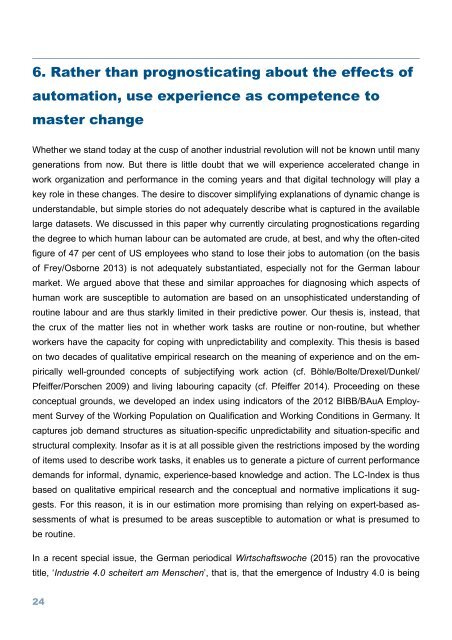DRAFT
237QXgQ
237QXgQ
You also want an ePaper? Increase the reach of your titles
YUMPU automatically turns print PDFs into web optimized ePapers that Google loves.
6. Rather than prognosticating about the effects of<br />
automation, use experience as competence to<br />
master change<br />
Whether we stand today at the cusp of another industrial revolution will not be known until many<br />
generations from now. But there is little doubt that we will experience accelerated change in<br />
work organization and performance in the coming years and that digital technology will play a<br />
key role in these changes. The desire to discover simplifying explanations of dynamic change is<br />
understandable, but simple stories do not adequately describe what is captured in the available<br />
large datasets. We discussed in this paper why currently circulating prognostications regarding<br />
the degree to which human labour can be automated are crude, at best, and why the often-cited<br />
figure of 47 per cent of US employees who stand to lose their jobs to automation (on the basis<br />
of Frey/Osborne 2013) is not adequately substantiated, especially not for the German labour<br />
market. We argued above that these and similar approaches for diagnosing which aspects of<br />
human work are susceptible to automation are based on an unsophisticated understanding of<br />
routine labour and are thus starkly limited in their predictive power. Our thesis is, instead, that<br />
the crux of the matter lies not in whether work tasks are routine or non-routine, but whether<br />
workers have the capacity for coping with unpredictability and complexity. This thesis is based<br />
on two decades of qualitative empirical research on the meaning of experience and on the empirically<br />
well-grounded concepts of subjectifying work action (cf. Böhle/Bolte/Drexel/Dunkel/<br />
Pfeiffer/Porschen 2009) and living labouring capacity (cf. Pfeiffer 2014). Proceeding on these<br />
conceptual grounds, we developed an index using indicators of the 2012 BIBB/BAuA Employment<br />
Survey of the Working Population on Qualification and Working Conditions in Germany. It<br />
captures job demand structures as situation-specific unpredictability and situation-specific and<br />
structural complexity. Insofar as it is at all possible given the restrictions imposed by the wording<br />
of items used to describe work tasks, it enables us to generate a picture of current performance<br />
demands for informal, dynamic, experience-based knowledge and action. The LC-Index is thus<br />
based on qualitative empirical research and the conceptual and normative implications it suggests.<br />
For this reason, it is in our estimation more promising than relying on expert-based assessments<br />
of what is presumed to be areas susceptible to automation or what is presumed to<br />
be routine.<br />
In a recent special issue, the German periodical Wirtschaftswoche (2015) ran the provocative<br />
title, ‘Industrie 4.0 scheitert am Menschen’, that is, that the emergence of Industry 4.0 is being<br />
24


